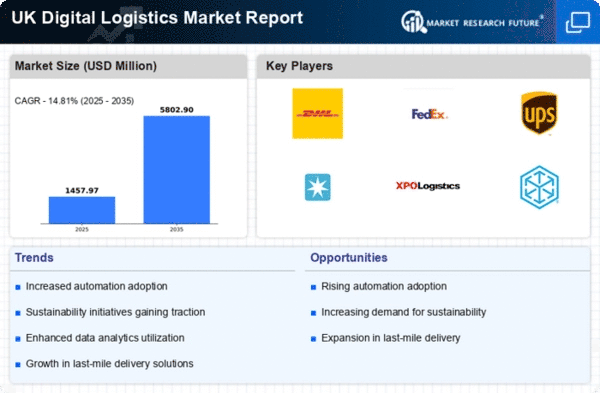Focus on Supply Chain Resilience
The digital logistics market is increasingly focused on building supply chain resilience in response to various disruptions. Companies are recognizing the importance of having flexible and adaptable logistics systems that can withstand unforeseen challenges. This shift is prompting investments in digital tools that enhance visibility and enable proactive decision-making. For instance, the implementation of blockchain technology can improve traceability and security within supply chains, potentially reducing fraud and errors. As businesses strive to create more resilient supply chains, the demand for innovative solutions within the digital logistics market is likely to rise, fostering a more robust logistics ecosystem.
Regulatory Compliance and Standards
The digital logistics market is increasingly shaped by regulatory compliance and standards that govern transportation and logistics operations. In the UK, regulations related to data protection, environmental sustainability, and safety standards are becoming more stringent. Companies must invest in digital solutions that ensure compliance with these regulations, which can be costly but necessary for maintaining operational integrity. For instance, adherence to the General Data Protection Regulation (GDPR) requires logistics firms to implement robust data management systems. This focus on compliance not only mitigates risks but also enhances the reputation of companies within the digital logistics market, potentially attracting more clients who prioritize regulatory adherence.
Technological Advancements in Logistics
The digital logistics market is experiencing a surge in technological advancements, which are reshaping the landscape of supply chain management. Innovations such as artificial intelligence (AI), machine learning, and the Internet of Things (IoT) are being integrated into logistics operations, enhancing efficiency and accuracy. For instance, AI-driven analytics can optimize route planning, potentially reducing transportation costs by up to 15%. Furthermore, the adoption of IoT devices allows for real-time tracking of shipments, improving visibility and customer satisfaction. As these technologies continue to evolve, they are likely to drive growth in the digital logistics market, enabling companies to streamline operations and respond swiftly to market demands.
E-commerce Growth and Consumer Expectations
The rapid growth of e-commerce in the UK is significantly influencing the digital logistics market. With online retail sales projected to reach £200 billion by 2025, logistics providers are under pressure to meet heightened consumer expectations for fast and reliable delivery. This shift necessitates the adoption of advanced logistics solutions, including last-mile delivery innovations and automated warehousing systems. Companies that can effectively leverage technology to enhance their delivery capabilities are likely to gain a competitive edge. As a result, the digital logistics market is poised for expansion, driven by the need to accommodate the evolving landscape of consumer behaviour and preferences.
Investment in Infrastructure and Connectivity
Investment in infrastructure and connectivity is a critical driver of the digital logistics market in the UK. The government has been actively investing in transport infrastructure, including roads, railways, and ports, to facilitate smoother logistics operations. Enhanced connectivity through digital platforms is also essential for integrating various logistics services. For example, the UK government allocated £1.5 billion for transport infrastructure improvements in 2025, which is expected to bolster the efficiency of logistics networks. As infrastructure improves, logistics providers can optimize their operations, leading to reduced transit times and costs, thereby stimulating growth in the digital logistics market.
















